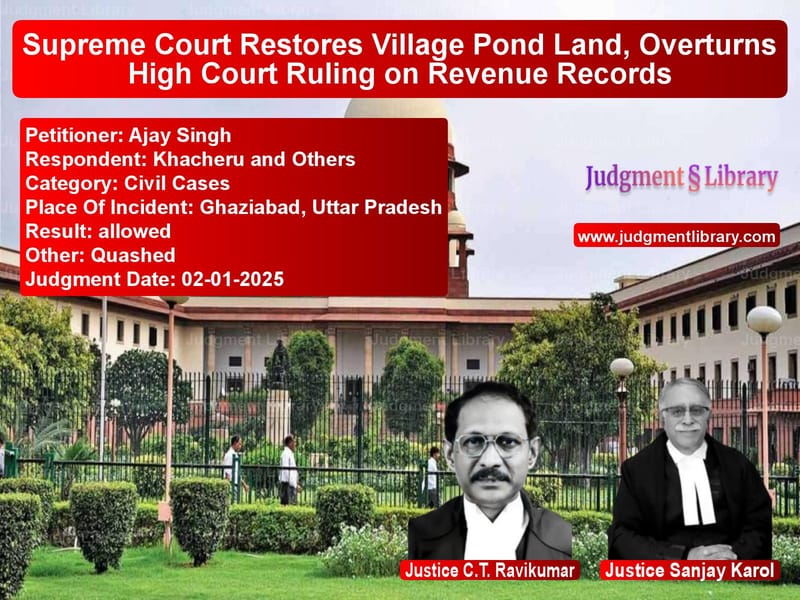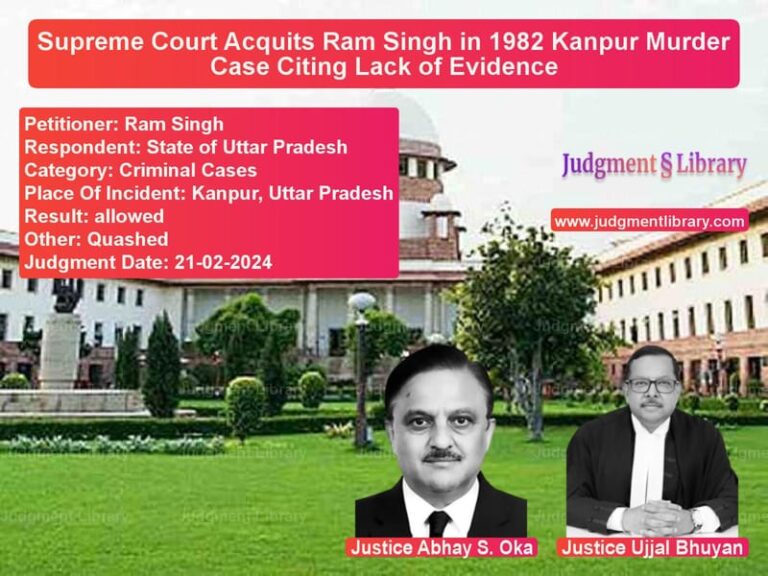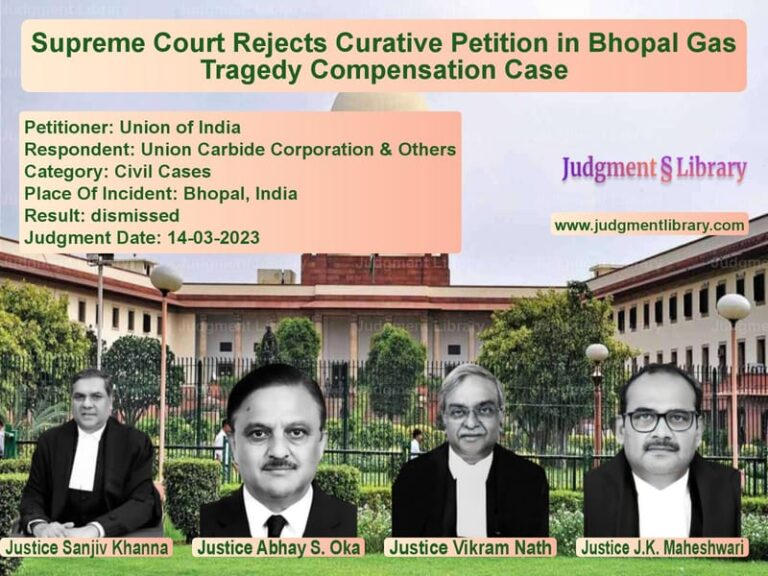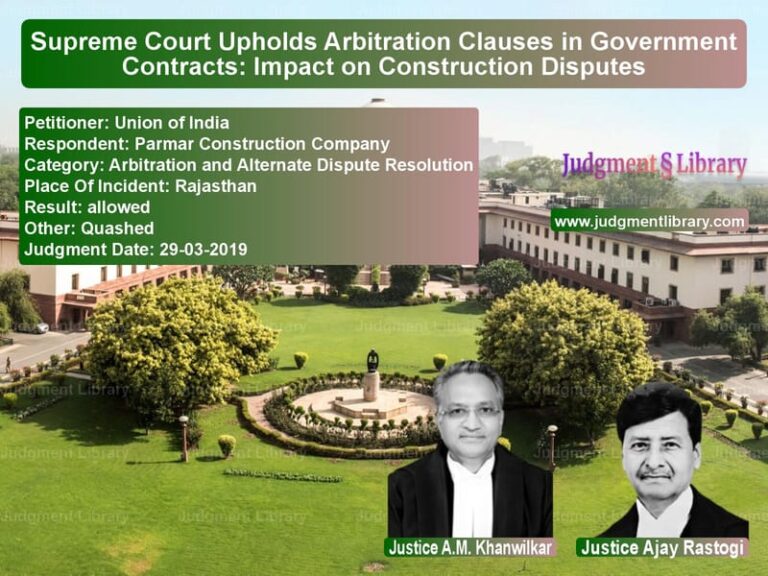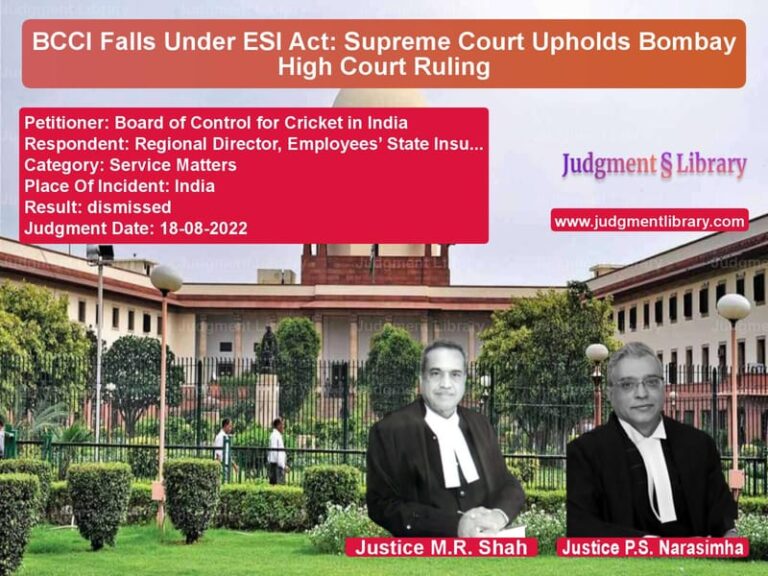Supreme Court Restores Village Pond Land, Overturns High Court Ruling on Revenue Records
The Supreme Court of India recently ruled in favor of the appellant, Ajay Singh, in a long-standing land dispute concerning Khasra No.103 in Ghaziabad. The case revolved around whether the disputed land was a ‘Johad’ (pond) or ‘Oosar’ (barren land), impacting its classification in the revenue records. The Supreme Court set aside the High Court’s ruling and reinstated the lower authorities’ findings that the land should be recognized as a pond.
Background of the Case
The land in question, recorded as ‘Johad’ in 1970, became the subject of a legal battle when Khacheru (respondent) claimed ownership based on alleged revenue entries from 1981-82. Ajay Singh (appellant) contended that the land had always been a community water body and that the patta claimed by the respondent was fictitious. The matter was initially heard by the Additional District Magistrate/Additional Collector, who ruled in favor of Ajay Singh, stating that the land was indeed a pond and that the patta claimed by Khacheru was fraudulent.
Key Legal Proceedings
- In 2004, the Additional District Magistrate found the respondent’s patta to be invalid and ordered corrections in the revenue records.
- In 2006, the Additional Commissioner dismissed the respondent’s revision petition, upholding the earlier ruling.
- In 2005, Ajay Singh obtained an ex-parte injunction from the Civil Judge (Junior Division) prohibiting the respondent from interfering with the villagers’ use of the pond.
- In 2007, the respondent challenged the rulings in the Allahabad High Court, which overturned the lower authorities’ decisions in 2013, ruling that the land was mistakenly classified as a pond.
- Ajay Singh then appealed to the Supreme Court.
Arguments by the Petitioner (Ajay Singh)
- The petitioner argued that the land had historically been recorded as a pond and was essential for the village community.
- He contended that no valid patta had ever been issued to the respondent and that the revenue records had been tampered with.
- He emphasized that the Additional District Magistrate and Additional Commissioner had already found the respondent’s claim to be fictitious.
- He also pointed out that the High Court exceeded its jurisdiction by re-evaluating factual findings in a writ petition under Article 226.
Arguments by the Respondent (Khacheru)
- The respondent claimed that the land was barren (‘Oosar’) and that he had a legitimate patta granting him ownership.
- He argued that the non-availability of the patta files at the Tehsil office was not his responsibility.
- He contended that the revenue records mistakenly recorded the land as a pond.
- He relied on the High Court’s findings that the land’s classification was changed due to an error.
Supreme Court’s Observations
- “The High Court, while exercising its jurisdiction under Article 226 of the Constitution of India, cannot reappreciate the evidence and arrive at a finding of facts unless the authorities below had either exceeded their jurisdiction or acted perversely.”
- “The revenue records from 1970 clearly classified the land as a Johad (pond), and no valid patta was found on record to justify the respondent’s claim.”
- “The findings of the Additional District Magistrate and Additional Commissioner were based on substantial evidence and could not be overturned without clear proof of legal or procedural error.”
- “An ex-parte injunction had been granted by the Civil Judge in favor of Ajay Singh, prohibiting the respondent from interfering with the land’s use as a pond. The High Court erred in dismissing this order without proper legal basis.”
Final Judgment
- The Supreme Court allowed the appeal, setting aside the High Court’s judgment.
- It reinstated the rulings of the Additional District Magistrate and Additional Commissioner, confirming that the land should be classified as a pond.
- The Court upheld the ex-parte injunction preventing the respondent from interfering with the villagers’ use of the land as a water body.
Conclusion
This ruling reaffirms the principle that writ jurisdiction under Article 226 cannot be used to overturn well-founded factual determinations made by lower authorities. The Supreme Court’s decision ensures that community water resources remain protected from unlawful encroachment and fraudulent land claims.
Petitioner Name: Ajay Singh.Respondent Name: Khacheru and Others.Judgment By: Justice C.T. Ravikumar, Justice Sanjay Karol.Place Of Incident: Ghaziabad, Uttar Pradesh.Judgment Date: 02-01-2025.
Don’t miss out on the full details! Download the complete judgment in PDF format below and gain valuable insights instantly!
Download Judgment: ajay-singh-vs-khacheru-and-others-supreme-court-of-india-judgment-dated-02-01-2025.pdf
Directly Download Judgment: Directly download this Judgment
See all petitions in Property Disputes
See all petitions in Landlord-Tenant Disputes
See all petitions in Judgment by C.T. Ravikumar
See all petitions in Judgment by Sanjay Karol
See all petitions in allowed
See all petitions in Quashed
See all petitions in supreme court of India judgments January 2025
See all petitions in 2025 judgments
See all posts in Civil Cases Category
See all allowed petitions in Civil Cases Category
See all Dismissed petitions in Civil Cases Category
See all partially allowed petitions in Civil Cases Category

